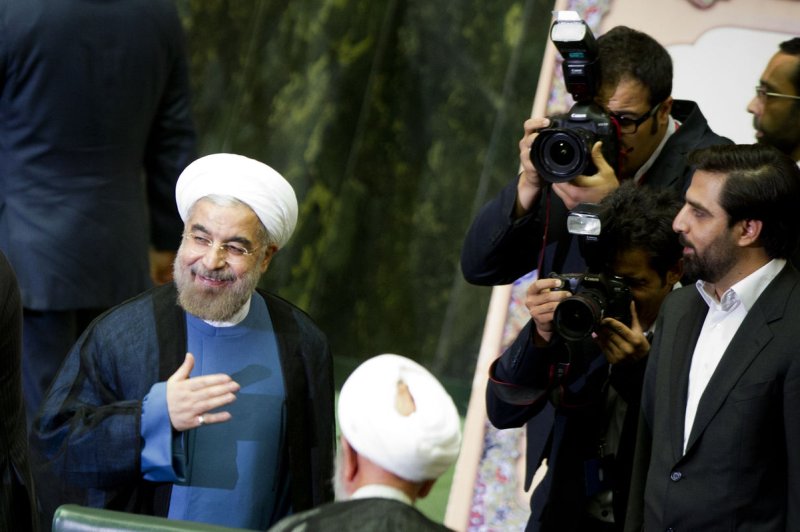Iran's new president Hassan Rouhani arrives at the Iranian Parliament to take the oath of office in Tehran, Iran, on August 4, 2013. Rouhani succeeded Mahmoud Ahmadinejad, who served for eight years. Some say it is likely Iran will want to maintain the multilateral agreement limiting its nuclear program even if the United States withdraws. Photo by Maryam Rahmanian/UPI |
License Photo
Both EU foreign policy chief Federica Mogherini and Iranian President Hassan Rohani have argued that the United States cannot, as a single signatory, tear up a ten-year multilateral nuclear agreement.
However, as the world waits for Donald Trump's inauguration as U.S. president in January, the far right in Washington continues to attack the Joint Comprehensive Plan of Action (JCPOA), the agreement reached in Vienna in July 2015 limiting Tehran's nuclear program.
Some argue Iran will simply walk away if the United States abandons or tries to renegotiate the landmark deal. After all, Iranian Supreme Leader Ayatollah Ali Khamenei warned in June that Iran would "set fire" to the agreement if Washington reneged on it.
Mogherini and Rohani hint at another possibility — that Iran maintains the agreement alongside the other signatories: Russia, China, Germany, France and Britain. Iranian Foreign Ministry spokesman Bahram Qassemi stressed that the deal was approved by the U.N. Security Council and he praised the "positive" EU approach and Tehran's "optimism" over ties with Europe.
What of Russia and China? For Washington to abandon international coordination over JCPOA would challenge Moscow, which has helped develop Iran's nuclear program -- building the Bushehr power station, scheduled as the first of three by 2025 -- and which has supplied arms to Tehran, including the advanced S-300 air-defense system. Beijing has been unimpressed with Trump's talk of high tariffs on its exports.
European companies seeking to invest in Iran are wary of U.S. retaliation but on the day Trump was elected, France's Total signed a $4.8 billion-$6 billion development deal for Iran's South Pars gas field and Norway's DNO recently agreed to a development study of the Changuleh oilfield in western Iran.
And in what is surely a pre-emptive move, BP excluded its American chief executive officer from a task force liaising with Iran over oil fields in Khuzestan province. The choice of Briton Brian Gilvary, BP chief financial officer, to lead talks is designed to minimize problems with the United States and to reassure the Iranians.
Such reassurance is important. A tough line from Trump when he is in the White House would embolden Iranian principlists, who would step up calls for expanding Iran's nuclear program, even if this alienates Europe, Russia and China and deters foreign investors.
Heading this off would test Rohani, facing re-election in May, and would require support from Khamenei, who in backing the JCPOA has continued to demonize the United States and rule out wider détente.
"Iran's best option is to react in ways that would create a distance between the U.S. and other world powers," said Farideh Farhi, of the University of Hawaii. "No matter how Iran reacts, it will be a systemic decision.
"While Rohani will be its public face, the decision will come out of an interactive process of discussion among key players and institutions," Farhi observed.
"Making sure that the global consensus that made crippling sanctions against Iran possible does not return is a challenge for Khamenei and the rest of Iran's political establishment."
For Tehran to uphold the agreement, limiting its nuclear program, would coincide with an intermittent Iranian foreign-policy tactic of splitting the United States from other international powers.
Iran's trade has expanded despite continuing U.S. obstruction since sanctions eased and it might continue to do so despite outright U.S. opposition. Tehran could also judge that a U.S. military attack would be far less likely if its nuclear program remained within JCPOA limits and under U.N. inspections.
The strategy would also require cooperation from Iran's Asian trading partners, but that might be forthcoming. In a recent interview in Tehran, Indian Ambassador Saurabh Kumar said whoever was U.S. president would make no difference to bilateral relations.
Kumar said he expected Chabahar port, being built by India in Iran's Sistan-Baluchistan province, to be completed within two years.
He envisages "a comprehensive partnership" in hydrocarbons, "both upstream and downstream," citing growing links between Iran and Indian refiners as well as Iran's offshore Farzad-B gas field, where Indian company ONGC wants to revive involvement ended in 2013 under U.S. pressure.
An India Oil Corporation subsidiary recently announced a $5.5 billion expansion of a refinery in Tamil Nadu partly owned by Iran, aiming to raise capacity to 300,000 barrels per day (bpd). Eager to supply India's energy demands, Iran overtook Saudi Arabia as India's top crude supplier in October, shipping 760,000 bpd, 50 percent more than in November 2015.
Asia buys 80 percent of Iran's oil exports, which have jumped to 2.4 million bpd, the highest since 2009 and double the level before sanctions eased.
India, Japan and South Korea have established payment channels, obstructed under sanctions, with Indian refiners' debts to Iran down from $6.11 billion in May to $2.55 billion in mid-November.
This all suggests that if Trump does abandon the JCPOA, other Asian countries could join Russia, China and Europe in refusing his lead. For Iran, keeping the agreement might not quite be business as usual but would be preferable to renewed isolation.
This column originally appeared at The Arab Weekly.















